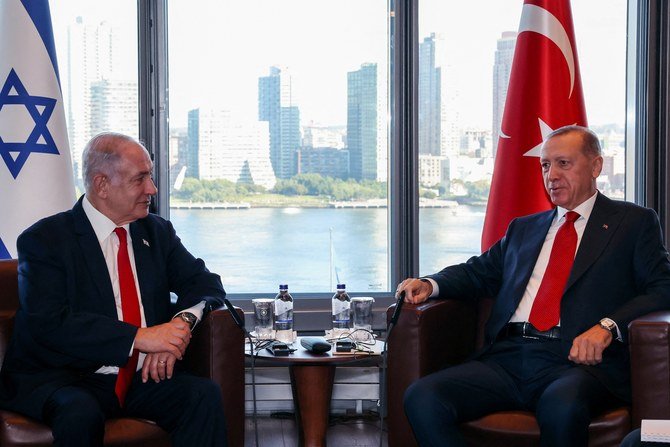By Anzila Adeen
On November 15th, 2023, the Turkish president Tayyip Erdogan called Israel a terror state while calling Israeli officials and its allies to be tried for war crimes. Ever since October 7th, Erdogan has remained critical of Israel’s actions in the Gaza Strip. This came just more than a year later when in August of 2022, Turkey and Israel had restored their diplomatic ties commemorating with exchanging ambassadors. Ever since the conception of the Jewish state, the relations between these countries have been at a constant push and pull.
Turkey had recognized Israel as a state a year after its creation in March 1949. A year succeeding, Turkey established a diplomatic mission in Tel Aviv. Their diplomatic relations strengthened until 1969, after more Arab territories were annexed and Al-Aqsa Mosque was set on fire. These acts were protested by Turkey. Proceeding this, Turkey recognized the Palestinian Liberation Organization (PLO) and then recognized the Palestinian state in 1988.
Turkey and Israel went through major strains since 2010, after the Mavi Marmara incident where Israeli Navy launched a raid which resulted in deaths of 9 Turkish activists. Turkey suspended its ties with Israel and demanded and official apology and compensation. Benjamin Netanyahu officially apologized in 2013 and the state provided compensation of 20 million USD. The restoration of complete diplomatic ties had its reasons.
According to the council of foreign relations, the restoration of diplomatic ties between Turkey and Israel came after Turkey strengthening its ties with Saudi Arabia and The United Arab Emirates. Both Turkey and Israel gain something from this decision. For Israel, it has been a priority to have the acceptance of a non-Arab country in the Middle East. Turkey is also important for Israel’s national security allowing closer intelligence monitoring over Iran. For Turkey, it has been their focus to be accepted by Washington. Turkish government has believed that pro- Israel groups and Jewish Advocacy organizations can help regarding the sales of their F- 16 fighters to Turkey and other imports to Ankara. Not only that, but to penetrate the American Market especially in the field of textiles, Turkey would perhaps establish their firms in Israel, and sell nominally Israel-made products into the United States.
Israel is Turkey’s 9th largest trade partner, with good exchange value at 8.4 million USD. Turkey has a big export market to Israel, exporting things like textiles, automotive parts, agricultural products etc. Even with the diplomatic freeze from 2010-16, The trade between the countries only increased. In 1996, the FTA, i.e. Free Trade Agreement was signed anticipating a quadruple increase in annual trade in only four years.
In succession, multiple agreements were signed, the Economic, Commercial, Technological and Scientific Cooperation Agreement; an Agreement for the Prevention of Double Taxation; and an Agreement for Mutual encouragement and Protection of Investments. In December 1996, the Agreement for Mutual Assistance between the Customs Authorities was signed. These agreements set the momentum for stronger relations in fields of transportation, energy, agriculture, education, construction, and tourism.
Turkey has decided to delist Israel as one of their top export targets. Ankara will stop motivating exports it will not subsidize business with Israel. Turkey has not mentioned if this decision was influenced by the conflict happening between Israel and Palestine while The Commerce Ministry said in a statement “Taking into account the global, political and economic conjuncture, studies have been carried out to determine the target markets to which our companies can be directed in 2024, in line with the aim of increasing our exports.”
Since 2022 however, Turkey and Israel have been in works for a joint energy drilling project. This was supposed to be a natural gas exploration pipeline through the Eastern Mediterranean, underwater to Israel’s largest natural gas field, Leviathan. It is worth noting that according to Forbes, Israel has individually made deals with European Union and other countries to develop natural gas resources to construct pipelines to Europe. Turkey has also expressed its readiness to export fuel to Israel amid tensions between Russia and Ukraine. This project however came to a halt considering Erdogan’s critiques on Israel post October 7th.
The nature of Turkey and Israel relations are fragile, with multiple diplomatic freezes and differences of stances. They have not let this affect their trade and economic relations to a certain extent, as they only grew even during above mentioned freezes. Although currently one can clearly understand the strains in their ties, one can only watch both countries’ next moves unfold.

